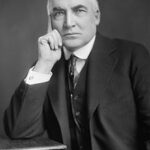The Teapot Dome Scandal emerged from President Warren G. Harding’s decision to appoint personal friends to key cabinet positions. These appointments prioritized loyalty over competence. The scandal centered on Interior Secretary Albert Fall’s illegal actions.
The Corrupt Appointments
Harding filled his cabinet with members of his “Ohio Gang.” These appointees lacked proper qualifications for their roles. Albert Fall became Interior Secretary despite questionable ethics. Harry Daugherty served as Attorney General with similar concerns. 💰 The president valued personal relationships over professional merit.
The Oil Reserve Scheme
Fall secretly leased naval oil reserves to private companies. The Teapot Dome reserve in Wyoming went to Mammoth Oil Company. California’s Elk Hills reserve was leased to Pan American Petroleum. Fall received substantial bribes for these illegal transactions. He collected over $400,000 in loans and gifts.
Discovery and Investigation
Suspicious activity triggered Senate investigations in 1922. ⚠️ Fall’s sudden wealth raised immediate red flags. His New Mexico ranch received expensive improvements. Investigators found clear evidence of bribery and corruption. The Teapot Dome Scandal became a national sensation.
Impact:
The scandal devastated public confidence in federal government institutions permanently. Americans lost faith in their elected officials’ integrity. The corruption extended far beyond oil reserves.
Political Consequences
🔥 The Republican Party suffered massive electoral losses in subsequent elections. Harding’s death in 1923 prevented his direct accountability. Albert Fall became the first Cabinet member imprisoned for crimes. He served one year in federal prison. Harry Daugherty faced multiple corruption charges. The “Ohio Gang” faced widespread prosecution.
Legal Precedents
The Teapot Dome Scandal established important legal precedents. Courts affirmed government authority over natural resources. Private companies lost their illegal oil leases. The Supreme Court validated federal ownership of reserves. These decisions protected public resources from future exploitation.
Long-term Government Reforms
📉 Congress implemented stricter oversight of executive appointments. New ethics rules governed cabinet member conduct. Financial disclosure requirements became mandatory for officials. The scandal influenced campaign finance reform discussions. Public demand for transparency increased significantly. Government accountability measures expanded throughout the 1920s.
Historical Legacy
The Teapot Dome Scandal remained the worst government corruption case until Watergate. It demonstrated the dangers of cronyism in high office. The scandal showed how personal loyalty could compromise national interests. Modern ethics laws trace their origins to this corruption.
